I had the pleasure of participating in France 24’s panel discussion program, The World This Week, last Friday. The other panelists were the IHT’s Anne Bagamery, AFP’s Dave Clark and RTL 4’s Stefan de Vries. Topics included the EU debt crisis agreement, Tunisia’s elections and the emergence of democratic Islamism in the aftermath of the Arab Spring, and the end of NATO’s mission in Libya. Part one can be found here. Part two can be found here. It was a fun and informative discussion. I was especially surprised to learn from Stefan, who was in Brussels covering the EU summit, […]
Defense & Security Archive
Free Newsletter
Tuareg fighters who fought for former Libyan leader Moammar Gadhafi were reported earlier this month to have returned to Mali to start a new rebel group. In an email interview, Baz Lecocq, professor of history at Ghent University, discussed Tuareg rebel groups. WPR: What are the main Tuareg rebel groups, and what are their main objectives? Baz Lecocq: Beginning with the start of decolonization in the 1950s, groups of Tuareg have protested, violently or otherwise, about their inclusion in Africa’s newly independent states, especially in Mali and Niger. In the 1990s, Tuareg in Mali and Niger engaged in protracted guerrilla […]
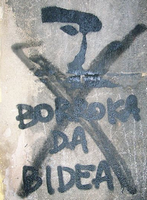
The violent Basque separatist group ETA recently declared a definitive end to its armed activity, 52 years after its founding. The declaration came in response to an appeal made on Oct. 17 by a group of international peacemakers, led by former U.N. Secretary-General Kofi Annan, that gathered in San Sebastián, Spain, for a carefully choreographed peace conference to help bring a close to what the group called “the last armed confrontation in Europe.” The phrase, and the presence of the peacemakers, irritated many in Spain who see ETA’s actions solely in terms of terrorism and have long considered the organization […]
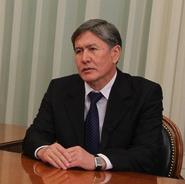
BISHKEK, Kyrgyzstan — For the past month, the word on everyone’s lips across Kyrgyzstan has been “raskol,” meaning “schism,” as voters nervously await a presidential election on Oct. 30 that will be an important test for the unity of the state. With the wounds of last year’s revolution and ethnic violence still fresh, fears of a national conflict along north-south lines are running high, a possibility that holds important implications for regional politics and the U.S. withdrawal from Afghanistan. Eighteen months after the April 2010 revolution that toppled authoritarian President Kurmanbek Bakiyev, Kyrgyzstan is struggling to consolidate its democracy in […]
Long before Afghanistan was an Islamic country, Buddhist settlements dotted its mountains and deserts. While the Taliban infamously destroyed the giant Buddhist statues of Bamyan Province in 2001, many archeological riches remain. This U.S. government-run Voice of America report examines efforts to preserve such riches.
In an apparent throwback to the Cold War era, Germany recently arrested a married couple suspected of acting as a sleeper cell on behalf of Russian intelligence. The news flew mainly below the radar of the English-language media, and it remains to be seen how German-Russian relations may be affected. But the arrests mark the first time since the fall of the Berlin Wall that suspected Russian spies have been arrested on German soil. For Ben Judah, a London-based policy fellow and Russia specialist with the European Council on Foreign Relations, that highlights an evolving challenge facing the Russian intelligence […]
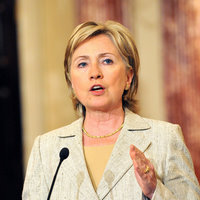
With President Barack Obama’s announcement last week that all U.S. troops will be out of Iraq by the end of this year, most Americans breathed a sigh of relief. Lost in those headlines was the collective shudder of national security experts and practitioners who know Washington’s dirty little secret: More than 10 years after the war against violent extremism began, the United States still lacks true deployable civilian power. The handover in Iraq from the Defense Department to the State Department at the end of this year will showcase this Achilles’ heel, one that will haunt U.S. foreign policy until […]
The new Libya is considering how it will live by Islamic Sharia law, which includes some traditional practices which some countries consider inhumane. Libyan National Transitional Council Chairman Mustafa Abdul Jalil has offered mixed remarks on the topic in recent days. While he has asserted that for Libyans “Sharia as the basic source of the law,” Jalil has also attempted to assure the international cummunity Libya is a nation of “moderate Muslims.”
The Yemeni government and a dissident general signed a ceasefire on Tuesday, amid continued violent unrest in the Yemeni capital of Sanaa. Security forces opened fire and sprayed water cannons on a protest march in the capital prior to the ceasefire and witnesses said five civilians including a child were killed in crossfire between state troops and opposition fighters in the city of Taiz.
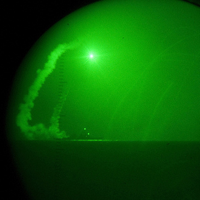
The battle to define the lessons of the Western intervention in Libya began almost as soon as the first Tomahawk missiles started hitting that country’s air defense network back in March. Many of the arguments have focused on the viability of the “Responsibility to Protect” doctrine of international humanitarian intervention and how it might apply to such countries as Bahrain or Syria. However, defense analysts also subjected the military character of the campaign to scrutiny, with some now suggesting the fight in Libya indicates that airpower has finally fulfilled its decisive promise, having matured to the extent that it can […]
Last month, South Africa unveiled the first-ever military plane to be designed and produced by an African country. In an email interview, John Dunne a specialist in defense economics at the Bristol Business School, discussed South Africa’s arms industry. WPR: What is the recent trajectory and current state of South Africa’s domestic arms industry? John Dunne: South Africa’s arms industry has been through considerable change since the end of apartheid rule. After serving as a comprehensive system supporting the apartheid state, it was allowed to decline under the post-apartheid government, with the state procurement and production entity Armscor being split […]

Turkey’s ongoing military operation on both sides of its border with Iraq highlights the recurring problem confronting the Turkish government and military in their fight against Kurdish terrorists: The insurgents’ area of operations, like the Kurdish population itself, straddles Turkey’s borders with Iraq, Iran and Syria. The governments of all four countries share an interest in suppressing Kurdish separatism and violence, but each has at times also found Kurdish terrorism to be a useful tool to pressure the others. This transnational component to the problem means that the current Turkish military operation, which followed coordinated attacks by the Kurdistan Workers’ […]
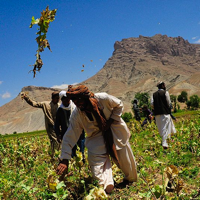
Since 2001, Afghanistan has become synonymous with the term “narcostate” and the associated spread of crime and illegality. Though the Afghan drug economy peaked in 2007 and 2008, cultivation this year still amounted to 325,000 acres, and the potential production of opium reached 6,400 tons (.pdf). Narcotics production and counternarcotics policies in Afghanistan are of critical importance not only for drug control there and worldwide, but also for the security, reconstruction and rule of law efforts in Afghanistan. Unfortunately, many of the counternarcotics policies adopted during most of the past decade not only failed to reduce the size and scope […]
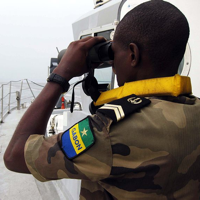
West Africa is rapidly becoming a major player in the global trade in illegal drugs and a central focus of the efforts to control it. Escalating arrests of West African drug traffickers at foreign airports, container shipments of cocaine seized off the West African coast and the collapse of entire African states under pressure from global drug cartels are some of the images used by international drug-control experts and the media to illustrate West Africa’s growing role in the trade in heroin and cocaine during the past decade. International experts claim that after having played an insignificant role in the […]
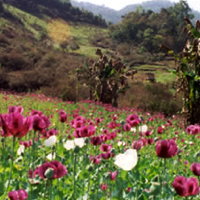
From the early 1950s until 1990, when Afghanistan’s opium production surpassed that of Myanmar, most of the world’s illicit opium originated in mainland Southeast Asia. This is partly because the region’s rugged hills and mountains, heavy monsoon rains and lack of transport infrastructure have long protected rebel armies and illegal opium poppy cultivation from the writ of central governments and anti-drug agencies. Myanmar’s turbulent political history and internal wars since its independence in 1948 also contributed significantly to Asia’s long reign as the global leader in illicit opium production, as the opium economy and the war economy clearly nurtured one […]
